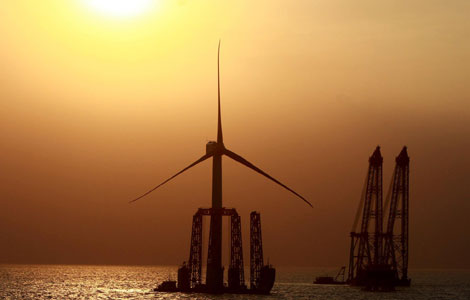Nation a 'world leader' in energy conservation
Updated: 2011-09-09 07:48
By Liu Yiyu and Zhang Yunbi (China Daily)
|
|||||||||||
BEIJING - China has become a world leader in saving energy and reducing emissions, Sha Zukang, undersecretary-general of the United Nations, said after the opening ceremony of the High-Level Symposium on the United Nations Conference on Sustainable Development in Beijing on Sept 8.
"China is the world's top country in terms of the policy and measures implemented in the fields of energy conservation and emissions reduction," said Sha.
However, it is inevitable that China's total emissions will continue to increase because of its development stage, according to Sha.
"The government, therefore, will need to cautiously balance economic growth and emission reductions."
China announced energy-conservation and emissions-reduction targets for the 12th Five-Year Plan (2011-2015) period on Sept 7.
Under the plan, energy use for each 10,000 yuan ($1,538) of GDP, or energy intensity, will drop to 0.869 tons of coal equivalent by 2015, compared with 1.034 tons in 2010, the government said in a statement on its website.
The target represents a 32 percent decline from the 1.276 tons of coal equivalent in Chinese energy consumption in 2005.
By 2015, energy intensity will be reduced by 16 percent and carbon intensity by 17 percent from 2010 levels, according to Zhang Ping, chairman of the National Development and Reform Commission.
China aims to save 607 million tons of coal equivalent by 2015.
The plan also said the government will further reform resource taxation. Taxes on oil, natural gas and coal are to be based on price rather than volume and tax rates will rise.
Between 2000 and 2010, China's energy intensity fell 44 percent. GDP expanded 9.5 percent year-on-year in the second quarter of 2011, but the growth rate is forecast to slide below 9 percent next year for the first time since 2001.
Sha hoped a renewed sense of political commitment would be the outcome of next year's UN Conference on Sustainable Development. He also stressed the importance of financial ministers' participation in formulating policies for sustainable development.
"Only by attracting more ministers of finance and foreign affairs to join in and run the council can we achieve the ideal goal of boosting energy conservation and sustainable development by economic cooperation," Sha said.
Related Stories
New system will cut Beijing's energy use 2011-09-02 08:18
When saving energy became a fashion 2011-08-22 09:46
China set to cap energy use 2011-08-05 09:14
'Clean energy can help reverse the deserts' advance' 2011-07-11 07:55
- Shanghai to build world's biggest expo center
- China launches temporary cotton reserve
- Monetary policy near inflection point
- Nation a 'world leader' in energy conservation
- Foreign brands accused of cheating
- Firms need more open climate
- Lenovo aims to seize global market share
- EU sees opportunity, urges access













